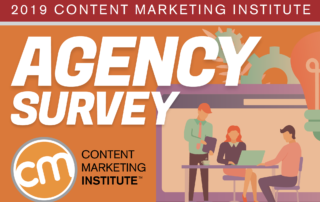CMI releases new research looking at agencies and content marketing delivery
Content Marketing Institute just released a new study, asking agencies about what content marketing services they offer, where they are having success and where they’re still banging their head against a wall. The data is based on 197 respondents, with 71% being US based and 61% of the respondents being owners/partners. There were several takeaways of note in this research and some of it supports what I am seeing among the agencies we serve and some of it makes me scratch my head and wonder a little bit. The results certainly support the idea that content marketing is not new. I’d argue that we’ve always been in the content business, we’ve just changed up the packaging over the years and decades. No great surprise — agencies are reporting that clients of all sizes are seeking help with their content. This isn’t going to change any time soon — and that’s good news for all of us. More surprising is that 73% of the agencies said they were extremely/very successful in achieving their client’s content marketing goals. Given the challenges that I hear agency team members talk about every day (getting the content, getting approvals, getting clients to see the long tail play off content, appropriate pricing related to expectations, etc.) I question this number. I’m sure it’s accurate from the research’s POV — I just wonder how those agencies are actually defining their client’s goals. I also wonder if our clients have the right goals. How often have you heard a client express frustration because their content isn’t driving immediate sales? Have we helped them really think through a content strategy that is big and bold enough? Or is it just a two blog [...]










